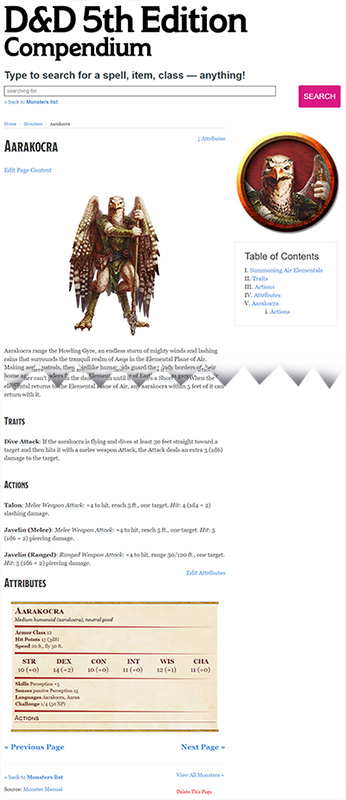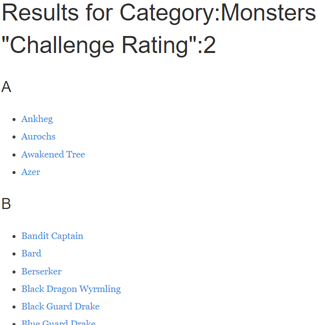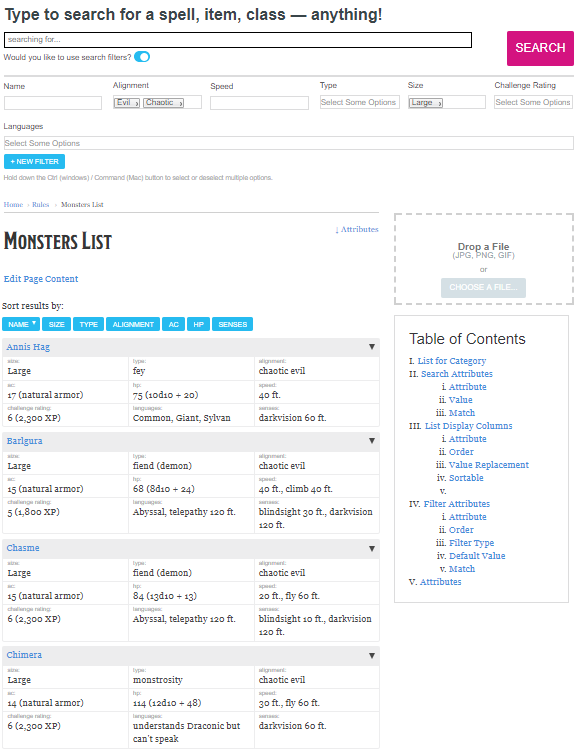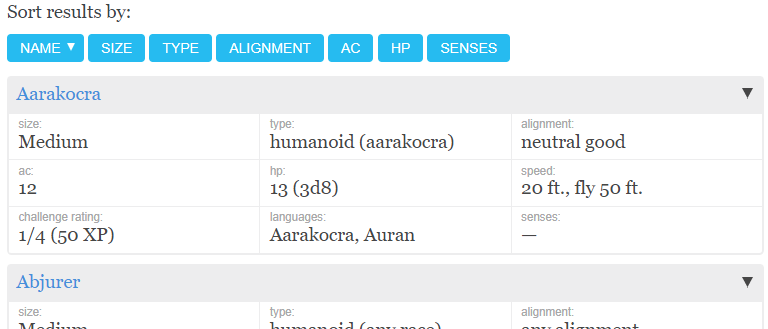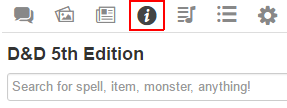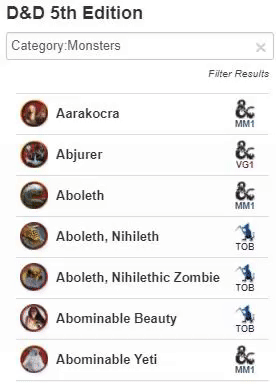Compendium
From Roll20 Wiki
Compendiums are "books" of indexed and categorized series of webpages devoted to a particular RPG rule system. It behaves and is designed similarly to a mini wiki. A Compendium can be browsed outside the VTT, but it also can be used within it for quick rule searches and populating fields on your character sheets like equipment and spells via drag and drop capability.
There are Compendiums that are freely available to use due to their OGL or CCPL status (I.e. D&D 5th Edition SRD, Pathfinder SRD, Dungeon World), but we also offer unlockable licensed material via our Marketplace like Wizards of the Coast's Volo's Guide to Monsters and Monster Manual or Kobold Press' Tome of Beasts.
Knowledgeable of a certain OGL/CCPL ruleset? Are you familiar with HTML text editing? Interested in building your own Compendium for the Roll20 community? Go here to learn how to become a volunteer!
Contents |
The Compendium Tool
You can access the available Compendiums by going to the website's main navigation bar and selecting Tools -> Compendium. This brings you to the Compendium Page where you can choose the Compendium you wish to browse.
Browsing a Compendium
Once you've selected a Compendium to browse, you'll first have a search bar available followed with an index of categories. Depending on the game ruleset in question, the available categories may be different, but what you will likely see are ones such as: Rules, Races, Classes, Items, Equipment, Spells, and Monsters. Underneath these categories are subpages and in some instances those subpages may be broken down into even further subpages. For instance, in the D&D 5th Edition SRD Compendium, the Spells category has subpages for each Class and each one of these pages is a list of spells which have their own dedicated page.
No matter which page of a Compendium you're on, there is a search bar directly above that allows you to look up for more entries at any time. The search looks for keywords used in the page title and header tags of an entry.
"Why isn't there an entry for (Spell, Rule, Monster, Etc.) in here?"
While it is possible that a Compendium could be missing content, especially in the case of newly built Compendiums, it's important to note that an OGL version of a rule system may not cover the entirety of the published rule system it's based from. For instance, the D&D 5th Edition OGL SRD does NOT have entries on Displacer Beasts or Mind Flayers, nor do they cover any other feats beyond Grappler. That is because they were purposely not included in the SRD (System Reference Document) when the publisher designed it. If something is missing from a Compendium, you should first check to see if that entry is actually part of the OGL SRD. If something is missing, contact the volunteers of that Compendium via the Character Sheets & Compendium forum.
Purchasing Compendium Expansions
Available on the Roll20 Marketplace are various Compendium Expansions. A purchase of one or more expansions grants access to entries that are not included in the original SRD (Volo's Guide to Monsters and Tome of Beasts are examples of purchasable Compendium Expansions).
To access this content, all you need to do is purchase the expansion of your choice. Once bought, all content under that expansion becomes immediately available to you. It's important to note that access to these expansions' content is only available to the users who have it purchased on their account. Players do not get default access to the content even if the purchaser of the expansion creates a game using the Compendium in question. That being said, a GM can create handout and character journal entries of Compendium content by dragging entries to the Tabletop to generate them. These journal entries can then be shared among players on an as-needed basis if they themselves do not have access to the expansion content.
Advanced Search
When navigating the Compendium outside the VTT, underneath the very large SEARCH button is a link called Advanced Search. Clicking on this will roll out an Attribute search underneath the main Compendium Search Field. You can select any available Attribute in the Compendium from the drop down menu that's presented and then fill out the desired Attribute value in the field to the right of the drop down menu. Once hitting enter/return after entering a value to search for, this will add it to the Search Field. The Advanced Search will remain visible so you can add even more search parameters by Attributes and they will be tacked on into the Search Field.
Once you placed the desired filters you want, click on the SEARCH button and you'll get the resulting entries that match all the parameters you added.
Currently, the Advanced Search feature is not available within the Compendium Tab of the VTT; however, you can search specifically for one or more Attributes. So in the Compendium tab, you can search the above example, Category:Monsters "Challenge Rating":2, to get the same results within the VTT.
Compendium Search Filters
List pages on the Compendium feature special Search Filters for certain compendium categories. These filters allow you to filter through the entries dynamically via Compendium attributes without having to use the Compendium's Search Bar. Examples of such can be seen on the Spells List and Monsters List pages of the 5E SRD Compendium. The filtered list of entries are displayed underneath the search filters.
Utilizing the Search Filters
The Monsters List of the 5E Compendium has search filters for monster Name, Alignment, Speed, Type, Size, Challenge Rating, and Language.
The Spells List of the 5E Compendium has search filters for spell Name, Level, Class, School, Ritual, Concentration, Casting Time, Range, Spell Attack, Damage Type, and Save.
With the exception of the Name field and the monster Speed field (which are simple text fields), the rest of these hard-coded search filters are either drop down multi-select fields or Yes/No radio buttons. When selecting one of the multi-select fields, you will have every option that's available for that listed attribute. For example, the Spell List filter for spell School has the available selection options: Abjuration, Conjuration, Divination, Enchantment, Evocation, Illusion, Necromancy, Transmutation, or Evocation. You can choose multiple options from a select search filter. Hold down Ctrl(Windows)/⌘(Mac) while clicking on a search filter to choose multiple options from the select drop down list. You can also add more options afterwards, by clicking on the empty space to the right of the last filter item within the input field to bring up the selection drop down menu again.
Creating Your Own Search Filters
Each list page has a hard-coded set of search filters; however, you can create additional filters if you can't find what you need there. Below the preset filters is a blue button labeled + New Filter. Clicking on this will create a new filter field that offers a drop down select to choose an attribute to search by and then a text field underneath that to enter what you're searching for. Every single attribute used in the Compendium is available from this filter drop down menu. For instance, say you wanted to find all monsters that wear scale mail. You would create a new filter for the AC attribute on the Monsters List page and then enter the keyword "scale" into the provided text field. The monster list would then be filtered down to all monsters that have the word "scale" listed under their AC attribute.You can delete a custom search filter at any time by clicking on the X icon to the right of the filter's text field. Also, custom filters do not persist after closing or refreshing the page.
Hiding the Filters
Right below the Compendium search bar is a toggle button labeled Would you like to use search filters?. Clicking on the toggle icon will hide or reveal the search filter options (shaded blue when revealed, grey when hidden).
The Filtered Results
Below the Search Filters are the entries that get filtered and listed as tabled data. Each entry block begins with the entry's name that is also hyperlinked to its specific page within the Compendium. To save time, the tables display all of the attributes available from the search filter section and several more that would be helpful to have included here.Sorting the List
Entries displayed in the list are sorted in alphanumerical order, but you change which attribute to sort the list under. Under the text Sort results by: are blue buttons that list every attribute that is displayed in the list. Click on any of these buttons to sort via that attribute. You'll be able to tell which is currently selected when an up or down arrow appears beside the attribute's name within the button. The arrow's direction indicates whether the sort is ascending or descending in alphanumerical order. Clicking on the same button will toggle between an ascending or descending list order.
Entry Summaries
Initially hidden from view, each search result entry has a summary which displays the first couple sentences of the linked Compendium page which includes a secondary link to direct you to the entry's page to view the rest of its content. You can reveal an entry summary by clicking on the down arrow to the far right of the entry's name. Clicking on this arrow again will hide the summary section again.
Adding a Compendium to your Game
Where the versatility of Compendiums truly shines is when one is attached to a game so that it can be utilized within the VTT. GMs and players can look up rules on the fly during their game and the GM can take whole entries from the Compendium and drag them to the tabletop to create a handout with the information contained within. While editing a character journal, the GM and players can drag items, spells, and other abilities from the Compendium into their character sheet to auto-complete elements on it. Monster entries will even create and populate entire NPC journals automatically and come with a linked token (when available) when the GM drags its entry to the Tabletop.
Compendiums can be tied to a community Character Sheet. A community sheet must be designed by its author to point to a particular Compendium first before VTT/Compendium functionality is available. For instance, choosing a D&D 5th Edition character sheet will automatically assign and enable the 5th Edition Compendium to be used in your game as well as Pathfinder sheets linking to the Pathfinder Compendium. You can choose a character sheet at game creation or by going to the Game Settings page at any time afterwards.
Once added, a new tab will be added on the Sidebar placed between the Journal tab and the Jukebox tab. This is the Compendium tab. Browsing and searching for entries within the Compendium Tab behave exactly as the webpage version. The only difference here is that the entries will pop up in their separate window when you select them from the tab.
If you're not relying on a Character Sheet to load a desired Compendium, you'll want to go to the Game Settings Page and choose the Compendium you want to use.
Entry List Data In-App
When browsing entries that have a List Page (like Spells or Monsters from the 5E SRD Compendium) on the external Compendium, you can pull down the same block of data that displays underneath the search filters within the VTT.
While looking through a listed category on the Compendium Tab, a down arrow icon will appear when you mouse-over over an entry. It will appear to the left of the entry name or token graphic (when available). Clicking on this icon will roll out that entry's info block. You can roll out as many entries in this fashion as you want on the Compendium Tab.
To hide the block of information again, mouse-over the entry and the arrow icon will point up instead of down. Clicking on this icon will hide the info block.
Book Expansion Sources
While viewing Compendium entries in-app, a publisher icon and a book title abbreviation will be listed on the entry's far right to signify where this info is sourced from. For instance, an entry from the Monster Manual expansion will have the Dungeons and Dragons ampersand logo as well as the abbreviation, MM1, underneath it. Kobold Press' Tome of Beast expansion entries will have a kobold logo icon and the abbreviation, TOB, underneath it.
5E Sources
| Source Book Name | Publisher | Icon | |
|---|---|---|---|
| 5E SRD | Wizards of the Coast | SRD | |
| Monster Manual | Wizards of the Coast | MM1 | |
| Volo's Guide to Monsters | Wizards of the Coast | VG1 | |
| Tome of Beast | Kobold Press | TOB |
Drag and Drop Functionality
When added to a game, a Compendium can speed up the process of content generation for a GM. Not only can you use the Compendium tab to look something up in the rulebook without opening a physical book or switching to another browser tab, but you can click and drag on a Compendium entry to pull it out of the Compendium tab for various automated purposes listed below.
Non-Monster Entries
Compendium entries that aren't designed as a complete NPC sheet (Rules, Races, Classes, Items, Spells, etc) will add a Handout to the Journal tab containing all the text and images from the provided Compendium entry after dragging and dropping the entry to the Tabletop. When in handout form, the GM can share this out to other players. This method is how you can grant players access to purchased Marketplace content like Volo's Guide to Monsters.
Monster Entries
If you look up a Monster/Beast/NPC entry in your Compendium and then drag and drop it to the tabletop, so long as you are using a Character Sheet that has this enabled, a Character Journal will be automatically created and statted using the content from the Compendium entry to fill out the various attributes and abilities.
Character Sheet Integration
When filling out a character sheet, if enabled by the Sheet Author, a player can drag and drop Items, Equipment, Abilities, Spells, and other entry types directly to the character sheet to automatically fill them out with the information provided by the Compendium entry. The range of interactivity depends on the Sheet's design.





